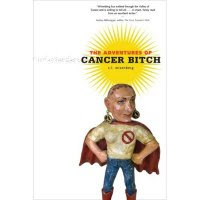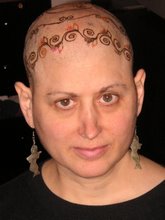
Scar project

I just came across this. This is one of a number of pictures of young women 18-35 who had breast cancer. The photographer is David Jay and you can find info about his book and project here.
I don't particularly love this picture with its S&M overtones (Hang 'er on the rack! It's not enough that we've sliced off her breasts!) but at least she's pretty and sexy in a Hollywood noir kind of way, and more importantly, it was the only photo from the web site that I was technically able to copy and paste.
Hill of Beans

The Huffington Post reports that scientists at Stanford have figured out a way to turn anxiety off and on in mice. About one-fifth of Americans are anxious in any given year, says the Huff Post, allegedly quoting the NIH, but the link didn't lead me to the source.
The scientists found ways of stimulating cell projections in the amygdala section of the brain, causing mice to be less anxious, and seem emboldened, spending more time exploring open spaces than control mice.
They sound like the mice I had in my old place. They would run around the kitchen with impunity, and stand there in the middle of the floor with the lights on, looking around. I don't know what emboldened them. Maybe their drinking water was contaminated with Prozac.
So here are many questions: What does it mean that one-fifth of us are anxious at any given time? Have humans always been anxious and are we only now finding a way to keep track of the numbers? Are we more anxious now because of our fast-paced life? Or eating food additives, or living with the minute hand so close to midnight, or with constant reminders of war and terror and uneven distribution of wealth?
Maybe we should be anxious. Since the invention of the telegraph, we humans have been able to transmit news of death and destruction immediately all over the world. Our species has grown cognizant that the earth is fragile. At the same time, we've been assaulting the earth with toxins, pollution, strip mines, cement and so on and so forth. Nature (tsunami, earthquake) combines with culture (nuclear reactors) to extend disaster.
Does anxiety to lead to working for social change? That's the real question. If we weren't all medicated, would we be up in arms more? Are we sedated and inert? Probably not. When I was at my deepest level of anxiety, I wouldn't answer the phone because I would start weeping. I was not in the mood to go to a rally or knock on doors. On the other hand, does political action lead to feelings of connectedness and mastery and increased self-worth? Yes, it can. So as the song says, Don't mourn, organize (while it's still legal).

... it doesn't take much to see that the problems of three little people don't amount to a hill of beans in this crazy world. Someday you'll understand that. Now, now... Here's looking at you kid.
Midnight in the Garden of Mammos

[still from CBS]
Today's Trib had a story about mammogram parties at local hospitals. Apparently this has been going on for quite a while. CBS reported in 2007 on midnight mammogram parties as well as mammogram parties earlier in the day. The idea is that women get together to make a party out of their annual checkups, employing chocolate, wine, cheese, flowers, manicures, camaraderie, massage to help them bear the painful pressing of the mammograpy machine. The funny thing is that the Trib had a story on this in 2010, as well as 10 days ago, by a different reporter, in the Des Plaines local. Today's (3/16/11) story says that the parties are for women who have not had cancer. Oh well. I had a farewell party for my breast. (You can see photos of it on the right.) Apparently that's old hat. And not above reproach: Writing in Jewish Woman magazine in 2010, Elicia Brown quotes Barbara Brenner, executive director of advocacy organization Breast Cancer Action:“People respond to crisis in whatever ways they need to cope. That’s what’s positive about this,” [Brenner] says. “But selling T-shirts, throwing Bye Bye Boobie parties—how does that get us closer to ending this epidemic? How does it get us closer to better treatment options that increase the quality of people’s lives? Too bad we can’t throw a Bye Bye Breast Cancer party!”
Too bad, but in the meantime, why not have fun while looking death and disease in the eye? Isn't that the basis of most rituals and festivals?

[Skull by Thaneeya McArdle]
In Qatar

It used to be that people wouldn't talk about cancer, especially breast cancer, and that women who noticed lumps would wait months and months and maybe years to get treatment. That's how it is in Qatar, according to a short video. Watch the film in a quiet place, because the volume is pretty low, at least it was on my computer.
Two million of us

There were 2,591,855 survivors of breast cancer in the US on January 1, 2007. That's according to a new study released by the Centers for Disease Control and Prevention and the National Cancer Institute. That's quite impressive. It comes to 22 percent more survivors since 2001 for breast cancer alone, and 20 percent for cancer overall. More and more are living with the disease, though there's living with and living with. Living with, for example, could actually mean dying. As the report states: Finally, the data do not permit specifying whether a cancer survivor is cured, in active therapy, living with a chronic cancer-related illness or disability, or dying from cancer.
Oh well. If you read the comments after the New York Times article about this, you get more food for thought. The commenters say that doctors over-test and over-diagnose, that survival isn't the be-all and end-all if you're out of work and the bank has foreclosed on your house, that toxins are still swirling about around and inside us.
I don't know what statistics would be more meaningful. You could see who has Stage 4, and count those people as soon-to-be-non-survivors, but then again some people are living with Stage 4 of various cancers. I suppose everyone is a survivor until they croak.
Subscribe to:
Posts (Atom)








